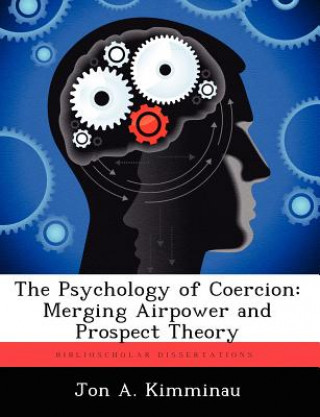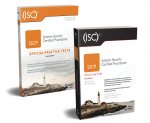
Code: 08138086
Psychology of Coercion
by Jon A Kimminau
This paper examines a model for thinking about coercion that explains airpower's role in achieving national objectives. Coercion is the use of power to achieve objectives, not by imposing the desired conditions upon an adversary, ... more
- Language:
 English
English - Binding: Paperback
- Number of pages: 88
Publisher: Biblioscholar, 2012
- More about this

You might also like
Give this book as a present today
- Order book and choose Gift Order.
- We will send you book gift voucher at once. You can give it out to anyone.
- Book will be send to donee, nothing more to care about.
More about Psychology of Coercion
You get 150 loyalty points
 Book synopsis
Book synopsis
This paper examines a model for thinking about coercion that explains airpower's role in achieving national objectives. Coercion is the use of power to achieve objectives, not by imposing the desired conditions upon an adversary, but rather by convincing the adversary to accept and implement those conditions as a negotiated solution to a confrontation. The foundation of coercion is the adversary's decisionmaking process, and most theories of coercion rely on a rational model that weighs costs, benefits, and expectations for success. Prospect theory provides a broad and intuitively appealing perspective on coercion, one that demands we consider the alternatives the adversary faces when we ask him to give up a course of action. Additionally, it incorporates the concept of risk, and thereby attempts to account for the variety of risk-taking and conservative behavior we see in conflicts throughout history. The central proposition is that how decisionmakers frame problems guides the decisions they make. A prospect theory model of airpower coercion is developed here that defines framing, decision parameters, alternatives of continuing action or acquiescing to demands, and airpower linkages. Six historical cases are examined to explore the value of the model, and they illustrate some distinct insights the model provides. Airpower strategies of punishment, denial, decapitation and airlift are shown to have multiple effects which influence many areas of the decisionmaking process. Strategists and organizations can derive a number of recommended tools and lessons from an examination of the model.
 Book details
Book details
Book category Books in English Society & social sciences Education
59.95 €
- Full title: Psychology of Coercion
- Subtitle: Merging Airpower and Prospect Theory
- Author: Jon A Kimminau
- Language:
 English
English - Binding: Paperback
- Number of pages: 88
- EAN: 9781249449294
- ISBN: 9781249449294
- ID: 08138086
- Publisher: Biblioscholar
- Weight: 172 g
- Dimensions: 246 × 189 × 5 mm
- Date of publishing: 20. September 2012
Trending among others
-

Cambridge IGCSE (R) & O Level Complete Physics: Student Book Fourth Edition
42.08 € -

Cambridge IGCSE (R) & O Level Complete Biology: Student Book Fourth Edition
42.08 € -

Cambridge IGCSE (R) & O Level Complete Chemistry: Student Book Fourth Edition
51.06 € -

Oxford IB Diploma Programme: IB Economics Course Book
62.27 € -

Oxford IB Diploma Programme: IB Theory of Knowledge Course Book
58.03 € -

Oxford International Primary Science Second Edition: Workbook 4
15.03 € -

Business Partner B1 Workbook
17.65 € -7 % -

CompTIA Security+ Review Guide - Exam SY0-601
24.72 € -24 % -

KS3 Maths 10-Minute Weekly Workouts - Year 8
8.07 € -8 % -

The End of Education
13.52 € -25 % -

English for Nurses Pre-Intermediate Level Book 1
9.58 € -9 % -

Cambridge IGCSE (R) & O Level Complete Biology: Print and Enhanced Online Student Book Pack Fourth Edition
61.26 € -

geog.2 Workbook
11.50 € -6 % -

Oxford IB Study Guides: Economics for the IB Diploma
47.73 € -

Teach Reading With Orton-gillingham
18.76 € -10 % -

KS3 Maths 10-Minute Weekly Workouts - Year 7
8.07 € -8 % -

Blue Book of Grammar and Punctuation: An Easy- to-Use Guide with Clear Rules, Real-World Examples , and Reproducible Quizzes, Twelfth Edition
15.13 € -28 % -

Business Partner B1+ Workbook
16.85 € -3 % -

Powerful Teaching: Unleash the Science of Learning
26.13 € -26 % -

Business Partner B2 Workbook
16.85 € -3 % -

Embodied Teen
21.69 € -16 % -

(ISC) SSCP SG & SSCP Practice Test Kit, 3e
65.09 € -28 % -

Growth Mindset Classroom-ready Resource Book
16.24 € -28 % -

AQA A Level Biology Revision Guide
25.63 € -5 % -

UKCAT For Dummies
23.21 € -28 % -

Oxford International Primary Maths Second Edition: Practice Book 1
12.20 € -

Oxford International Primary Science Second Edition: Student Book 1
26.84 € -

Donny's Unauthorized Technical Guide to Harley Davidson 1936 to Present
48.04 € -16 % -

OET Speaking for Nurses Book 2
11.60 € -2 % -

Edexcel International GCSE Chemistry Student Book Second Edition
31.68 € -14 % -

Oxford International Primary Maths Second Edition: Practice Book 2
12.20 € -

Cambridge IGCSE (R) & O Level Complete Physics: Print and Enhanced Online Student Book Pack Fourth Edition
63.08 € -

Walk Your Talk; Tools and Theories To Share Nonviolent Communication
29.36 € -

OET Speaking For Nurses Book 1
12.81 € -

Oxford International Primary Maths Second Edition: Practice Book 3
13.62 € -

Social Skills Activities for Secondary Students wi th Special Needs, Third Edition
26.33 € -22 % -

AQA GCSE German Foundation Practice Papers
15.33 € -

geog.1 5th edition Workbook Answer Book
56.51 € -

New KS2 English Year 5 Foundation Grammar, Punctuation & Spelling Targeted Question Book w/Answers
8.97 € -5 % -

AQA French A Level Year 1 and AS
50.46 € -

Making Escape Rooms for Educational Purposes
18.76 € -

Cambridge IGCSE (R) & O Level Complete Chemistry: Print and Enhanced Online Student Book Pack Fourth Edition
63.08 € -

New KS2 English Year 4 Foundation Grammar, Punctuation & Spelling Targeted Question Book w/Answers
8.97 € -5 % -

Education in the New Age
12.91 € -

240 Vocabulary Words Kids Need to Know: Grade 3
11.80 € -17 % -

Oxford IB Diploma Programme: Oxford IB Diploma Programme: IB Mathematics: applications and interpretation Standard Level Enhanced Online Course Book
95.38 € -

Oxford International Primary Maths Second Edition: Practice Book 5
16.14 € -

OET Preparation
9.68 € -

Speed and Accuracy: Multiplication
8.57 €
Collection points Bratislava a 2642 dalších
Copyright ©2008-24 najlacnejsie-knihy.sk All rights reservedPrivacyCookies





 15549 collection points
15549 collection points Delivery 2.99 €
Delivery 2.99 € 02/210 210 99 (8-15.30h)
02/210 210 99 (8-15.30h)